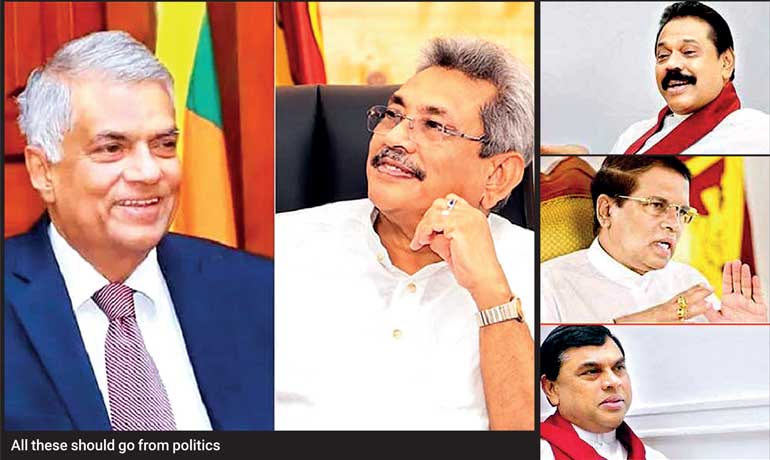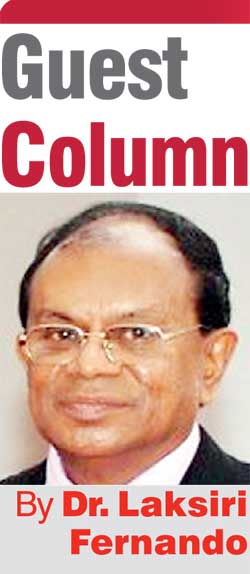Monday Feb 16, 2026
Monday Feb 16, 2026
Thursday, 26 January 2023 00:59 - - {{hitsCtrl.values.hits}}


In a month’s time, the future of Sri Lanka will be decided not only in democratic terms but also in economic terms. There will be a strong democratic uprising if the Government fails to hold the local government elections scheduled to be held in March 2023. By next month, whether the Government allows the Elections Commission to hold the elections will be clearer. This is going to be the litmus test.
Democracy and Free Economy are like twin sisters. No parent should try to neglect one against the other. Both are necessary to address people’s economic needs, human rights, and social wellbeing. Although Sri Lanka has been one of the pioneer countries to introduce universal franchise (1931), and democratic governance (1947), since the introduction of a presidential system (1978), democracy has taken a strong downturn, the predicament of which is experienced throughout the country by all sections of society.
Past character of the President?
It is no accident that the present President, Ranil Wickremesinghe, who has now come to power by accident, was a strong supporter of the presidential system that his uncle introduced in 1978. Therefore, there is no further surprise that he now makes his full efforts not to hold local government elections, clearly realising that his party or his (Rajapaksa) allies will not be able to win the elections.
It is well known that his popular support is minimal. An overwhelming majority of his UNP party broke away in 2020 and formed the Samagi Jana Balawegaya (SJB – United People’s Movement) under the then deputy leader, Sajith Premadasa.
When Ranil Wickremesinghe contested from the UNP for the Colombo District in 2020, he obtained only 30,875 votes (2.61%)! Therefore, some people called him ‘two percent leader’! He, however, obtained a nominated seat in Parliament through the ‘national list,’ a much controversial system that his uncle J.R. Jayewardene introduced to distort the electoral system in the country.
Now he is the President! This situation itself shows that there is much distortion in the democratic system in Sri Lanka which must be corrected as soon as possible with the support of the international community. Does this situation have any economic repercussions? Yes, this is my observation and opinion. Let me raise the question who brought him to this power? It is well known, but some people forget that it was Gotabaya Rajapaksa, a war criminal, who brought him to this situation.
Of course, Gotabaya Rajapaksa had a popular backing of 6.9 million at the last presidential elections. But this does not apply to Ranil Wickremesinghe. Among the poor-quality political leaders of the country, RW appears to have some knowledge of economics! But his ideology prevails over this knowledge or ability.
He talks about a ‘social market economy.’ But practices a ‘pure market’ yet depending on friends and associates. He was directly involved in the Bond Scam in 2015. He is also largely responsible for the present economic crisis, being the Prime Minister and the Minister of Finance during 1915 and 1919. Didn’t he know about the unbearable debt obligations that the country was burdened with by that time? He repeatedly took loans and even sold the Hambantota port to China!
Aragalaya and the President
There is no question that the burning of his house in Colombo during the Aragalaya (struggle) last year was reprehensible. No democratic struggle in the country should go to that extent although the Universal Declaration of Human Rights warn the governments that “if man is not to be compelled to have recourse, as a last resort, to rebellion against tyranny and oppression, that human rights should be protected by the rule of law” (UDHR Preamble).
Could there be any doubt that the rule of Gotabaya Rajapaksa was like ‘tyranny and oppression’? He was not elected for that purpose in 2020. People do make mistakes in voting, but democratic systems allow people to correct them through democratic discussion, dialogue, regular elections and believing in human rights. However, I have never heard Wickremesinghe talking about human rights even as deception! This is no surprise because he is a member of the International Democratic Union (IDU), which was founded by people like Margaret Thatcher and George W. Bush. The members of this group call themselves ‘centre-right,’ perhaps to avoid the more realistic characterisation of ‘far-right.’
The last stages of Wickremesinghe-Sirisena rule in 2019, the Easter Sunday attacks happened like ‘Sri Lanka’s holocaust’ and until recently no iota of justice was served. Sirisena is the other culprit of economic-political disasters of the country like Gotabaya, Basil, and Mahinda Rajapaksa. All these people should go away from politics, and if not, they should be completely thrown out. Like Sirisena, Wickremesinghe also should be responsible for the Easter attacks.
Look at the way leaders in mature democracies behave. In New Zealand, Jacinda Arden was elected as the Prime Minister in 2017 from the Labour Party. She has now given her resignation allowing another leader to take over. Few months before Sri Lankan ‘holocaust,’ two Muslim mosques were attacked by a single terrorist on the other side. Arden stood for justice firmly. Almost everyone admired the courage and impartiality of her.
During the last couple of years, many countries faced similar crises and challenges with Covid 19, economic depressions, terror attacks, and global warming. Except people like Donald Trump or our lot, many leaders did not stick to power but duty. Duties are something that our political leaders are probably unaware of. When people have rights, the leaders have and should respect their duties. Otherwise, they should go home.
Importance of local governments
The local government institutions are the base of our democracy with ancient roots. Throughout centuries, people used to rely on Grama Sabhas (Village Councils) for their day-to-day necessities and functions. When I was a child, I clearly remember what the Moratuwa Urban Council (now Municipal) did for our community. Collection of faeces and disposing of them; maintenance of roads and cleaning them; and looking after health of the people through PHIs, Midwives and Dispensers are some I can closely remember. There were no major political rivalries. The best people were elected, but mostly left-oriented ones. No one appeared to make money or be involved in heinous activities.
During my academic career (1969-2010 with intervals), I have been involved in research on the local government system with colleagues and students in Monaragala, Badulla, Kalutara and Mahiyanganaya. The potential of Pradeshiya Sabhas particularly in democracy and economic development were very clear. Visits to Jaffna and Kilinochchi had confirmed the same. This is what Ranil Wickremesinghe, and the Rajapaksa gangs are now trying to destroy.
Wickremesinghe’s uncle, J.R. Jayewardene, also postponed the local government elections in 1978 and thereafter, on the pretext of introducing a District Council system. I was in Jaffna in 1981 and experienced the repercussions just before the burning of the Jaffna Library. It was to the credit of R. Premadasa that the Pradeshiya Sabha Act could be passed in 1987 and resurrect the local government system again with a clear link to the social and economic developments in particularly the rural areas. Premadasa’s background in the old Labour Party perhaps engineered this connection. Wickremesinghe’s background in this respect was and is the opposite.
For a peaceful uprising
I again would like to reiterate that the burning of Wickremesinghe’s house in Colombo and other houses of Ministers and MPs is completely reprehensible. The occupation and damaging of the President’s House and Presidential Secretariat also cannot be approved whatever the anger of the people and youth. These violations happened in line with Donald Trump’s instigations and politics in the USA.
However, Wickremesinghe should not lead the country in the same manner. If somebody named ‘Anil’ was involved in those burnings and violence, Ranil should not follow Anil, and abuse people’s political power and democratic system. If that is the case, the people have every right to protest and stage a democratic uprising. To avoid that, Wickremesinghe should allow the holding of local government elections without any interference. Otherwise, in my opinion, it would be his political suicide.
A peaceful and democratic uprising would be the most effective and legitimate. I would propose the Samagi Jana Balavegaya (SJB) and the Jathika Jana Balavegaya to get together in this democratic and peaceful venture. The support of Tamil and Muslim parties also should be sought. Any Aragalaya (struggle) without a clear direction and leadership would be hijacked by unreliable, anarchist and misguided sections.